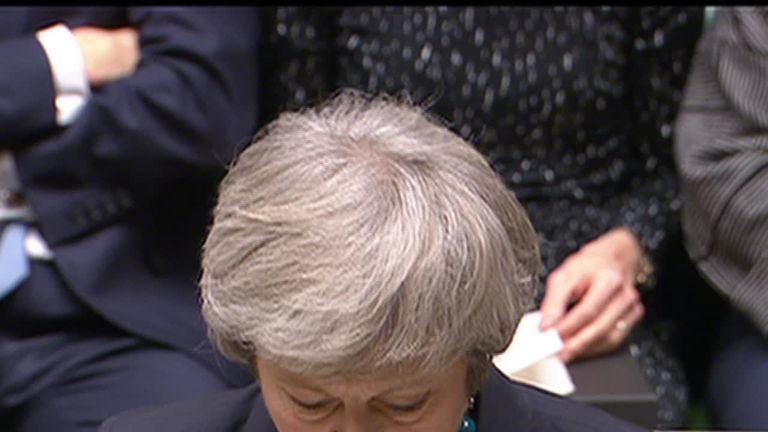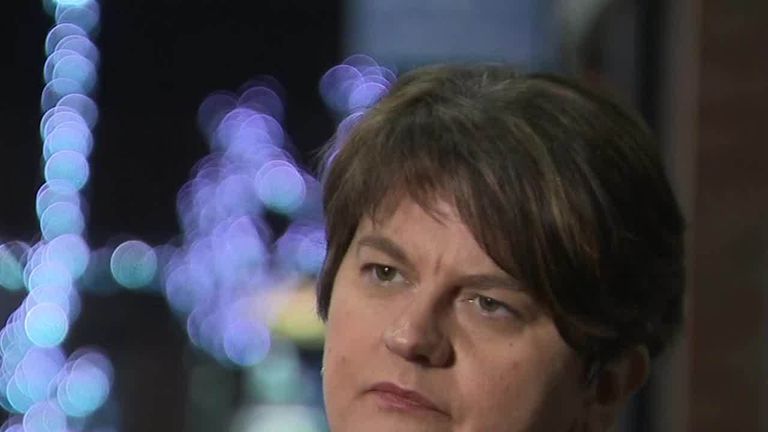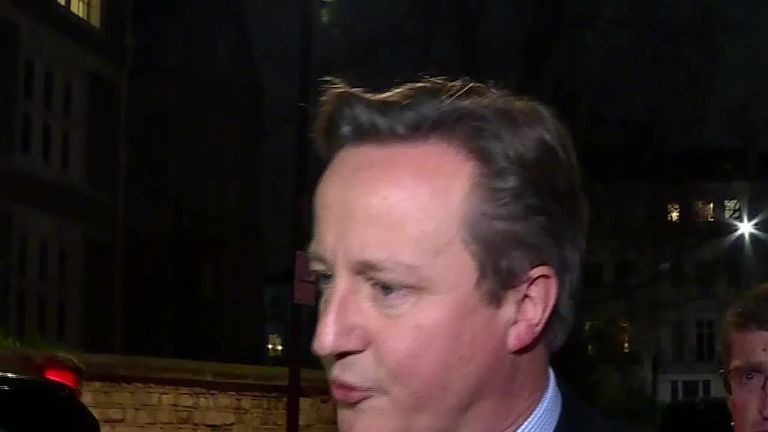Theresa May delays vote on Brexit deal and admits she faced 'significant' defeat
The PM avoids a parliamentary showdown and says she will head to Brussels to discuss the "clear concerns" over the deal.
Monday 10 December 2018 22:53, UK
Theresa May has dramatically postponed a House of Commons vote on her Brexit deal, admitting she would have suffered a "significant" defeat.
The prime minister confirmed in a statement to MPs she had delayed the meaningful vote on her EU agreement, which had been scheduled for Tuesday night, as she attempts to keep alive both her deal and her premiership.
Mrs May told parliament she will instead head to an EU summit in Brussels this week to discuss the "clear concerns" of MPs about her deal's so-called backstop arrangement.
A three-hour "emergency debate" on the decision to pull the vote is scheduled for Tuesday, after an intervention by Labour leader Jeremy Corbyn.
:: What PM hopes to achieve by pulling Brexit vote
Over the weekend, the prime minister held telephone calls with a series of EU leaders, including European Council President Donald Tusk, European Commission President Jean-Claude Juncker, Irish Prime Minister Leo Varadkar and German Chancellor Angela Merkel.
Mrs May also promised to continue to explore how parliament could "place its own obligations on the government to ensure that the backstop cannot be in place indefinitely", as many MPs fear.
"If we went ahead and held the vote tomorrow the deal would be rejected by a significant margin," Mrs May said.
"We will therefore defer the vote scheduled for tomorrow and not proceed to divide the House at this time."
:: Backstop? Cliff edge? Brexit jargon explained
Despite admitting her current reassurances to MPs over the possible use of the backstop have not been adequate, the prime minister rigorously defended her deal and expressed her belief she can still win over a majority of the Commons to see it passed.
Using her statement to deliver a direct challenge to MPs, Mrs May asked: "Does this House want to deliver Brexit? And if it does, does it want to do so through reaching an agreement with the EU?
"If the answer is yes, and I believe that is the answer of the majority of this House, then we all have to ask ourselves whether we are prepared to make a compromise.
"Because there will be no enduring and successful Brexit without some compromise on both sides of the debate.
"Many of the most controversial aspects of this deal - including the backstop - are simply inescapable facts of having a negotiated Brexit."
:: What does latest 'no-deal' Brexit advice reveal?
In response to the prime minister's statement, Mr Corbyn told Mrs May her government had "lost control of events and is in complete disarray".
"This is a bad deal for Britain, a bad deal for our economy and a bad deal for our democracy. Our country deserves better than this," he said.
The prime minister also faced anger from the DUP, the Northern Irish party who prop up her minority government at Westminster.
DUP leader Arlene Foster claimed the delay to a vote on the Brexit deal "sums up the chaotic nature of the government's approach to these negotiations".
Calling on Mrs May to ditch the backstop arrangement altogether, Ms Foster added: "The prime minister was warned that this deal would not work but did not listen.
"The fundamentally flawed withdrawal agreement would have undermined our United Kingdom economy and the Union itself.
"The backstop would have left Northern Ireland trapped as a hostage to the European Union. The prime minister must get rid of the backstop. It is not needed. No one is building a 'hard border'."
Leading Tory Brexiteer Jacob Rees-Mogg, who chairs the European Research Group of Conservative Eurosceptic MPs, renewed his threat to Mrs May's occupancy of 10 Downing Street.
He said: "What has two years of Theresa May doing Brexit amounted to? An undeliverable deal parliament would roundly reject, if the prime minister has the gumption to allow it to go before the House of Commons.
"This is not governing, it risks putting Jeremy Corbyn into government by failing to deliver Brexit. We cannot continue like this. The prime minister must either govern or quit."
Meanwhile, Scottish First Minister Nicola Sturgeon accused Mrs May of "pathetic cowardice" by avoiding the vote on her deal, adding: "Yet again the interests of the Tory party are a higher priority for her than anything else."
Despite the prime minister's intent to travel to Brussels this week to discuss the backstop arrangement, both Mr Varadkar and a spokesperson for Mr Juncker reiterated on Monday there will be no renegotiation of Mrs May's deal.
The Irish government added that preparations in Brussels for a 'no-deal' outcome should "intensify".
Mrs May will embark on a tour of European capitals this week in a bid to bolster support with her deal, starting with meetings with Mrs Merkel and Dutch Prime Minister Mark Rutte.
During her appearance in the Commons, the prime minister herself admitted trying to reopen the legal text of the withdrawal agreement could mean other issues "would then be put back on the table".
This includes a Northern Ireland-only backstop arrangement both she and the DUP have already rejected but was previously pushed by the EU, Mrs May added.
On Monday night, former prime minister David Cameron spoke to Sky News to give a rare review of the state of Brexit negotiations.
"Of course I don't regret calling a referendum," he said, speaking outside an event in west London.
"I made a promise in the [2015] election to call a referendum, I called the referendum.
"Obviously I'm very concerned about what's happened today. But I do support the prime minister in her efforts to try and have a close partnership with the EU.
"It's the right thing to do and she has my support."
Earlier, the European Court of Justice ruled that the UK has the right to unilaterally revoke the Article 50 notification to leave the EU without the permission of other member states.









